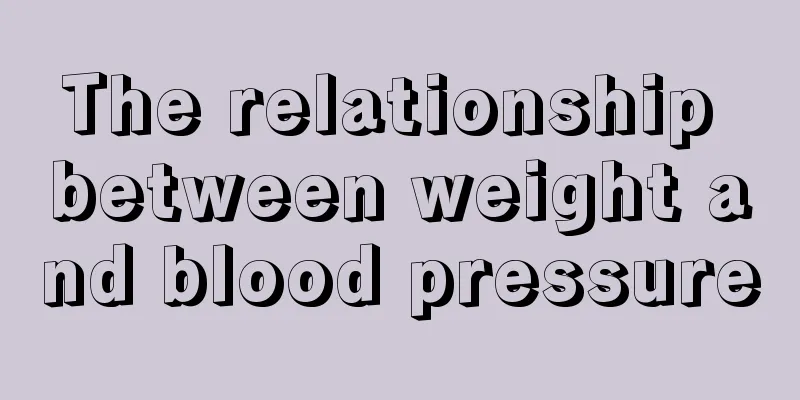The relationship between weight and blood pressure

|
Blood pressure is an important indicator of human health. Blood pressure is related to many factors. For example, many people have high blood pressure because they are overweight. However, hypertension caused by this reason cannot be effectively treated with antihypertensive drugs, and weight control is required. Below, we will introduce to you in detail the relationship between weight and high blood pressure and other related knowledge! 1. The relationship between weight and blood pressure In obese hypertensive patients, a 5 kg weight loss will reduce their blood pressure by about 4 mmHg. And for those patients who lost more than 5 kg. The drop in blood pressure is much greater than that for those who lose less than 5 kg. For those who lose an average of more than 5 kg, their blood pressure drops by 5-6 mmHg. For every kg of weight lost by obese hypertensive patients, their blood pressure will drop by about 1 mmHg. 2. How to control weight Obese hypertensive patients can reduce their weight from obvious moderate obesity to mild obesity by limiting calorie intake and increasing effective and reasonable exercise. It is even close to normal, which has a significant effect on lowering blood pressure, and blood pressure can be well controlled by using drugs in smaller doses than usual. Not only is the dosage reduced, but symptoms of hypertension such as shortness of breath, fatigue, chest tightness, dizziness, and brain swelling are also significantly improved. Physical strength has been significantly restored. Therefore, in the treatment of hypertension in obese patients, weight loss should be the first step so that the treatment of hypertension can reach a reasonable and effective optimal level. 3. How should obese hypertensive patients lower their blood pressure? For obese hypertensive patients, antihypertensive drugs have relatively little effect, and weight loss can help lower blood pressure. In addition to weight loss, beta-blockers among antihypertensive drugs are more effective for obese patients; clonidine and diuretics are also very effective in treating obesity and hypertension; calcium antagonists and angiotensin-converting enzyme preparations have a protective effect on the kidneys in the treatment of obese hypertensive patients, can improve insulin resistance and inhibit sympathetic nerve function. The above drugs are beneficial for antihypertensive treatment in obese hypertensive patients. |
<<: Blood pressure changes during a day
>>: Is 140 blood pressure normal?
Recommend
What are the best plants to place in the bedroom?
After decorating a new house, modern people will ...
Can kidney deficiency cause dry cough?
Recently, it has been said that kidney deficiency...
What to do if your skin itches after taking a shower
The weather is hot, and most people take a shower...
Can purple oil wood leaves repel mosquitoes?
There are many animals and plants in nature. With...
Doing one thing while urinating is most beneficial to the kidneys
Traditional Chinese medicine has many effective f...
What is the reason for burping after eating
Hiccups are a phenomenon that occurs in people of...
Is sesame paste good for calcium supplementation?
Sesame paste is a food we often eat. There are ma...
What is the reason for farting after gastric cancer resection surgery
Many people are undergoing gastric cancer treatme...
What are the functions of soaking onions in red wine
Maybe we all have eaten onions. Onions have becom...
T3 high
Thyroid function test is a very common examinatio...
How much does surgery for transverse colon cancer cost
How much does surgery for transverse colon cancer...
What medicine is good for cholestasis
Cholestasis is a very common disease among pregna...
Let’s analyze the causes of brain cancer
The incidence of brain cancer in China is getting...
What to do if your ankles are rubbed black by shoes
The blackening of the ankles by shoes can be impr...
How to treat uremia and hyperphosphatemia?
Many patients with uremia will develop hyperphosp...









